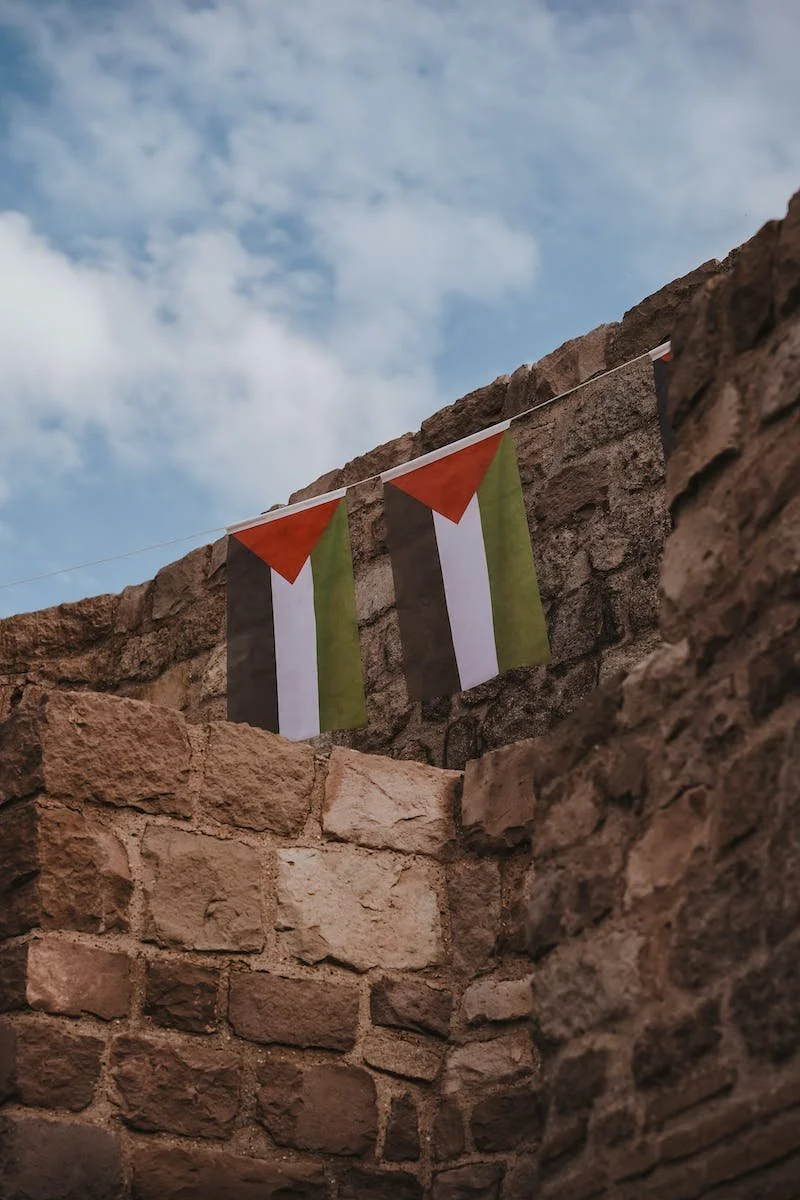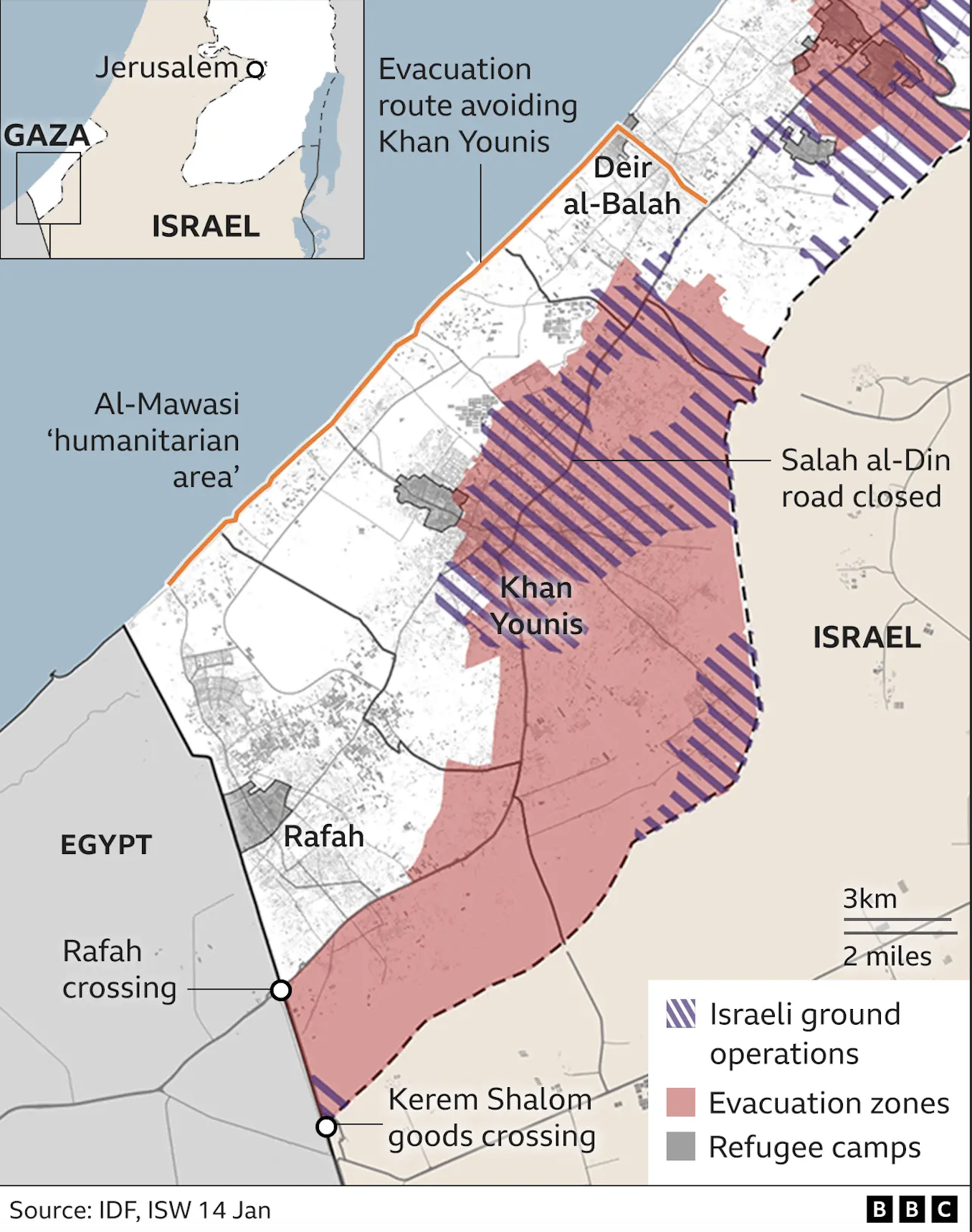Update on Palestine
Since early December, we have witnessed the death toll and amount of injured Palestinians rise, soaring past 27,131 killed and 66, 287 injured between Oct. 7, 2023, and Feb. 2, 2024. According to “BBC”, over half of the buildings in Gaza, including residential areas, farmland, schools, and all universities have been destroyed between Oct. 7, 2023, and Jan. 31, 2024. Israel has been fighting and bombing as far south as Khan Younis. During the Superbowl on Feb. 11th, Israel attacked Rafah, the southernmost city in Gaza located on Egypt’s border and currently the location of Gazan displacement camps housing over half of the population who are exhausted, traumatized, hungry, and sick. In an article from The Nation, “as of [Feb. 12], the Gaza Health Ministry estimates that Israel killed at least 67 Palestinians in the Super Bowl attacks. That doesn’t account for the number injured or the attendant trauma…The Israeli government is crowing of victory after freeing two hostages. And much of the US media is following suit, relegating the deaths of Gaza civilians to a footnote.” Israel has been ordering civilians to move south or be killed in the crossfire in the north, but Israel is also bombing the south, specifically in places they told Gazans would be safe. On Feb. 9, an article from the New York Times reported that “Prime Minister Benjamin Netanyahu has ordered the Israeli military to draw up plans to evacuate Rafah, a Gazan city packed with more than a million people, in advance of an expected ground offensive.” The big question is, where will they go? Again, Rafah is the southernmost city, and if the Gazans are evacuated outside of Palestine, will they ever be able to come back? If Israel and Palestine’’s history is anything to go off of, then no.
In late December, South Africa filed an application against Israel in the International Court of Justice, stating Israel's actions in Gaza violated the terms agreed to in the 1948 Convention on the Prevention and Punishment of the Crime of Genocide. On Jan. 26, the International Court of Justice ruled in favor of South Africa, ordering Israel to “take all measures within its power to prevent the commission of all acts within the scope of Article II of the Genocide Convention,” but did not explicitly call for a ceasefire. Whether or not Israel is actually following the court’s orders is up to question. Detailed in “The Intercept,” between the ruling and Feb. 5, Israeli forces continued their campaign and “killed at least 874 Palestinians and injured at least 1,490 in Gaza alone according to Palestinian Health Ministry figures.”
During December, Israel rounded up hundreds of Palestinians who remained in the north of Gaza — whether it be due to not being able to make the journey south to the designated safe areas or not wanting to leave their homes. The Israeli Defense Force (IDF) separated them from their families and detained boys as young as twelve and men as old as seventy for interrogation. Since then, photos, videos, and testimonies have surfaced detailing the torture inflicted. An article from Associated Press reported that the IDF “forc[ed] men to strip to their underwear before trucking some to a detention camp on the beach, where they spent hours, in some cases days, subjected to hunger and cold…Soldiers kicked sand in their faces and beat those who spoke out of turn.” The Guardian stated that investigations by Reuters and +972 magazine found that the torture methods included “electric shocks, cigarette and lighter burns, stress positions and deprivation of sleep, food and toilet facilities.” The Guardian talked with Lubbad, a Palestinian man who works at the Palestinian Centre for Human Rights and was among the detained. He said in a statement “The Israeli soldiers photographed us inappropriately and compelled some of the detained boys to dance. They set fire to the homes of the Muqayd, Mahdi, Kahlot and Sorour families in front of us while we were seated in the street.” Additionally, the Office for the Coordination of Humanitarian Affairs (OCHA), a United Nations agency focused on humanitarian emergencies, “received shocking testimonies from recently released Palestinian prisoners and detainees, in which they reported that the Israeli army invited a number of Israeli civilians during their interrogation sessions to witness torture and inhumane treatment, to which they were deliberately subjected in the presence of the civilians.”
Many countries including the United States, Canada, and the United Kingdom have all cut funding from the United Nations Relief and Works Agency for Palestine Refugees in the Near East (UNRWA). Established in 1949 to aid the thousands of Palestinians who were forced from their homes and into Gaza, West Bank, and neighboring nations, this United Nations agency focuses on providing humanitarian aid, education, and social services to Palestinian refugees. According to their official website, “UNRWA is the primary humanitarian agency in Gaza, with over 2 million people depending on it for their sheer survival. Many are hungry as the clock is ticking towards a looming famine. The Agency runs shelters for over 1 million people and provides food and primary health care even at the height of the hostilities.” By cutting funding, the UNRWA may be unable to continue providing lifesaving aid.
Meanwhile, in the West Bank, the other Palestinian territory, tension continues to heighten. In an article published by “The New Humanitarian,” a 42-year-old street vendor named Ibrahim BuNasrah in Ramallah, West Bank states “Road blocking and closures mean my days are wasted in going from one place to another…Commuting between districts of the West Bank has become like traveling to the unknown: You don’t know what new checkpoint will be set up, and which group of settlers you will be attacked by.” On that note, violence has also increased with more Israeli military raids, physical assaults, and threats of murder from settlers. As reported in an article from “Amnesty International,” “With the world’s eyes fixed on Gaza, Israeli forces have over the past four months unleashed a brutal wave of violence against Palestinians in the occupied West Bank, carrying out unlawful killings, including by using lethal force without necessity or disproportionately during protests and arrest raids, and denying medical assistance to those injured.” Additionally, according to “The New Humanitarian,” Israel “suspended all permits allowing Palestinians living in the West Bank to work in Israel or in Israeli settlements in the occupied territories. The International Labour Organisation (ILO) estimates that this move eliminated around 208,000 jobs – about 24% of all employment in the West Bank.”
Not even five months since October and the death toll is enormously high and it seems the situation is only getting worse, which is why it is so important to not stop talking about Palestine. Some ways to help Palestine is to donate to the UNRWA or Palestinian Children’s Relief Fund. You can also write to your elected representatives, sign petitions, and use your voice to advocate. You can support Palestinian businesses and boycott Israeli ones along with businesses that support Israel. The Boycott, Divestment, Sanctions (BDS) movement has a lot of information on the latter.
For more information, follow journalists in Palestine such as Bisan, Motasem Mortaja, Motaz Azaiza, and Plestia Alaqad on Instagram.
Further resources:
Contextual Information
Everything you need to know about Israel-Palestine - A Comprehensive Guide from Vox
The Israel-Palestine conflict: a brief, simple history - Vox
Human rights in Palestine (State of) - Amnesty International
Palestine Remix - History of Palestine from Al Jazeera
Life in Occupied PALESTINE by Anna Baltzer - A Documentary from 2014
Shireen Abu Akleh | Biography, Death, Funeral, & Al Jazeera - Britannica
The War
Israel’s war on Gaza updates - Al Jazeera
Gaza activist tells of beating and abuse in Israeli detention - The Guardian
Netanyahu rejects Gaza ceasefire deal and says victory is ‘within reach’ - The Guardian
Hamas ceasefire proposal details - Reuters
America and the Middle East
U.S. Aid to Israel in Four Charts | Council on Foreign Relations - Council on Foreign Relations
U.S. and U.K. launch new wave of strikes, this time targeting Houthis in Yemen - NBC News


